- Home
- M. K. Hume
King Arthur: Dragon's Child: Book One (King Arthur Trilogy 1) Page 7
King Arthur: Dragon's Child: Book One (King Arthur Trilogy 1) Read online
Page 7
As the great Caesar had cast dice many, many years before, Artorex threw the bones on to the mosaic floor.
Morgan took off her ghastly eye-band before rocking and moaning over the pattern the bones had made on the tiles. Her voice seemed to come from far away.
‘You bear poisoned blood, Great One. Beware of a woman with yellow hair, for she will lead you to ruin.’
‘Surely you can give me something better than that,’ Artorex challenged her.
Morgan stared at him through the lamplight. Her voice changed, and became deeper.
‘Greater even than thy father, and greater than thy son, you will save your world for a time but it will be at the cost of all that you hold dear. Time will not change you, nor shatter your promise. You shall live, though your body be dead, long after the might of Rome has fallen into the dust.’
The family was struck dumb by the enormity of Morgan’s prophecy. Caius’s mouth was twisted into a sneer of jealousy and Artorex knew the master’s son would make him suffer for the promise in the words of this wise woman.
‘You can spare me your promises, for today is enough for me,’ Artorex snapped, annoyed by the riddles in her words. ‘And what of you, Morgan? Do you dare to turn your gift upon yourself ?’
‘I will cast also,’ Morgan replied, still staring enigmatically into the eyes of the young man.
She swept up the bones in one eloquent hand, and cast them down.
‘Blood calls to blood, whether I wish it or not. You should call on me, should you ever have need of me. My life skein is tangled with yours, and my name will endure as long as yours lives. I am bound inextricably to you by old wrongs.’
Caius rose to his feet. His temper and resentment was clearly exposed in his dark eyes and Julanna flinched away from his peremptory hand.
‘Well, I’m sure this little game has all been very interesting, but Julanna and I are for our bed,’ Caius ordered, and led his reluctant young wife from the eating chamber.
Livinia and Ector also rose to their feet.
‘We thank you for your gifts,’ Livinia said for both Ector and herself.
As the mistress led her husband away, Morgan bowed low until she was a dark puddle of shadow on the bright floor.
Artorex snapped his fingers and servants scurried to clear away all signs of the family meal. He noticed that the women gave Morgan a wide berth and one old grandmother surreptitiously made the age-old sign to ward off the evil eye.
‘Come, Morgan.’ Artorex offered his hand. ‘This evening’s charade is over. When are you going to tell me what you really want?’
‘I wanted to see your face,’ Morgan answered, with her head tilted upwards so she could see his unusual eyes.
‘And?’
She took his hand and rose to her feet, the accoutrements of her trade having disappeared inside the voluminous black robe. Her fingers were soft and dry, like the skin of a snake, but he sensed the strength that lay under the surface.
‘I have nothing else to tell you, my lord. Nothing you do not know for yourself. ’
‘I have no idea what you are talking about,’ Artorex said irritably.
‘But I do not believe you came to Villa Poppinidii by accident. We are some little way east of the road that leads to the north.’
Morgan smiled. ‘I believe now that you have not been told of your birthright. How surprising! Sometimes the ways of men are very strange. Now that I look at you, I can see a little of your mother in you,’ she added. ‘It is in your eyes, Artorex.’
‘You are speaking in riddles yet again. Perhaps it is the language of all charlatans.’ Artorex paused as Morgan’s pupils flared for a moment with an intense white fire. ‘Or perhaps you believe what you say. Who was my mother?’
‘It is not my place to tell you, my lord, if greater ones than I have kept silent.’ Morgan smiled and, for a brief moment, her face lit up from within and she was very beautiful indeed.
‘You should not invest me with titles that are not mine to claim,’ Artorex replied evenly, although his hand tingled from contact with her slim fingers. He frowned at her. ‘Where is your home?’
‘I am from the Fortress Tintagel, lord. I tell you nothing by saying this, for you have probably never heard of such a place.’ Morgan slid to the doorway.
‘You’re correct, Morgan, but I will not forget you,’ Artorex promised grimly.
At his words, she paused for a moment, and stared back at him with eyes that drew the light to her face. ‘Of that, I have no doubt. There is no forgetting with those of your blood - as you will come to learn.’
And then she was gone.
Artorex arose early next morning, before the sun had banished full darkness, but Morgan had left even earlier while the night was still wholly black. He would be a man full grown before he heard of her again. When he looked at the empty road, he crossed himself in the Christian manner. It did no harm to take precautions against the evil ones.
Life at the villa continued in its seamless patterns of nature. It seemed, to Artorex’s young heart, that nothing could ever change. Occasionally, a message would arrive by a courier for Ector, and the master would look grave for days. The same courier sometimes brought another scroll for Artorex from the mysterious Llanwith pen Bryn but, mostly, Artorex was content with his world, and all that existed within it.
Julanna was to effect the changes that would shatter Artorex’s calm. Little Julanna, already pregnant, and frightened as the child swelled within her belly, begged leave to invite a friend from Aquae Sulis to visit for the duration of her confinement.
As Lady Livinia could not bear to deny anything to the mother of her grandchild, she agreed that word should be sent to the trading house of Gallus, so that the daughter of that wealthy family should be invited for a long stay at the Villa Poppinidii.
And so fate decided that Artorex would meet Gallia, daughter of a Roman trading family, and his life would change direction once again.
CHAPTER IV
GALLIA
Spring had come and the whole world of the villa bloomed anew. Buttercups appeared under trees in the lower meadows and the cows grazed belly deep in waving grasses and wild flowers. Trees exploded with tender pink and pale green shoots, while the fields ached to produce the crops that would ripen in late summer.
Frith led the women in the collection of herbs and simples that were hung, upside down, to sweeten the villa as they dried. Meanwhile, Julanna checked the long track from the Roman road every day, pining for the companionship of her friend, and Mistress Livinia watched her daughter-in-law with concerned, apprehensive eyes. The villa held its breath . . . and waited for change.
Artorex was far off in the south pasture when a heavy wagon struggled up the road to the Villa Poppinidii. It was loaded high with chests and boxes, so even Livinia wondered if the child meant to stay forever, so deeply were the wooden wheels of the cart driven into the muddy track.
Under a small, tent-like structure, Gallia reclined on cushions amidst the piled excesses of her luggage. Only when the wagon drew to a halt, and her maid and manservant helped her to descend, did Livinia clearly view the changeling that Villa Poppinidii had welcomed into its family. From her vantage point at the thick wooden doors of the villa, Lady Livinia watched their guest approach in a flurry of shawls, wrapped packages and restless fingers.
The new arrival proved to be an extraordinary young girl, for all that she was a bare fourteen years of age. Her face was small and unbalanced by a long nose, but there was great sweetness in her rosebud mouth and kindness in her amber eyes that were so out of tune with her curly black hair. That hair, unbound except for jewelled pins as befitted a maid, seemed to crackle with wildfire, as did her compact little body.
Gallia was tiny, even by Lady Livinia’s standards, but her body was almost vulgarly lush at the breasts and the hips. She took great pride in a tiny waist, pinching in her pleated peplum with a belt of freshwater pearls from the north, embroidered on leather-b
acked linen.
Now here’s a little miss, was Livinia’s first thought as the child approached her at a rush. But then Gallia smiled, and even the cloudy day seemed brighter for her unalloyed joy in all those marvels she had yet to experience.
After bowing low to the master and mistress of the house, against all the rules of good manners Gallia had clapped her hands, giggled delightedly and then kissed Lady Livinia’s cheek.
The mistress was momentarily taken aback by Gallia’s forwardness and presumption, but the girl smiled so sweetly with her head cocked sideways like a colourful bird that Livinia felt her reservation melt.
‘I beg your pardon, my lady. My father would be ashamed of my rackety ways, but I’ve waited so long to see my sweet Julanna that I could burst with excitement.’
Lady Livinia frowned and Gallia looked chastened.
‘I’m gabbling again, aren’t I? I shall be apologizing every day, I’m sure, because I can’t bear silence and I always fill it with chatter - or so my brothers tell me.’
‘Never mind, child,’ Ector chuckled in avuncular good humour. ‘We don’t stand on ceremony here.’
‘No, indeed, Gallia,’ Lady Livinia began kindly. ‘Good heart counts for more than empty manners.’
‘Oh, I do hope so,’ Gallia said with an impish grin. ‘I’ll try to avoid talking too much.’
Scarcely pausing for breath, Gallia proceeded to regale Lady Livinia with tales of her journey, the appalling condition of the roads and the beauty of Villa Poppinidii. How Gallia talked. Silence was not her métier and she filled the villa with her tinkling laughter. She was enchanted by the atrium and was charmed by the sheep and cows as only a city girl could be, and very full of reminiscences of her friendship with Julanna.
Despite her natural reserve, Livinia found herself smiling as the child prattled on - and on.
Her servants soon stowed her many belongings into the best guest chamber and, once again, Gallia was delighted by the comfort of her quarters.
‘For I can actually hear birds, Lady Livinia,’ she smiled. ‘Real birds, not those poor things that languish in cages. I do think they sing more prettily when they are free, don’t you?’
Scarcely pausing for breath, Gallia fell upon a simple pottery beaker filled with wild flowers.
‘Oh, how kind you are. The flowers have no smell in Aquae Sulis, but these are heavenly.’ She smiled again. ‘Thank you, Lady Livinia, I know I will be very comfortable in your wonderful house.’
‘Hush, child!’ Livinia replied when Gallia seemed to run out of superlatives. ‘Julanna picked these trifles from the fields at dawn. She has desired your company so desperately, but I fear you will find little to divert yourself in our quiet country life.’
‘Oh, I don’t care a jot for entertainment. Games make me queasy and Father keeps parading young men before me as if I were a prize heifer. I will so enjoy a holiday from marriage proposals and the smell of fish.’
Unwillingly, Lady Livinia laughed. The maid was so outspoken and so frank in her observations that even the mistress’s Roman reserve fell away under her charm. Gallia might well prove to be the perfect companion for Julanna, for who could be sullen or sad around this laughing girl?
‘And is Julanna well?’ Gallia asked more seriously. ‘I, for one, wouldn’t care if I never saw Aquae Sulis again. She is fortunate to live in Villa Poppinidii, for the air here smells so sweet.’
‘Julanna is a little afraid of her coming labour, although it is five months before her child is due to be born. She needs a companion to make her laugh and help the days pass more easily.’
Gallia so forgot herself as to wink at Lady Livinia, but the mistress lacked the heart to chide this engaging child.
‘I’ll cheer her up, never fear, mistress. I have brought gifts from my father and any number of amusements with me. We shall be as happy as the birds in the trees.’
When Julanna saw her friend in the doorway of her room, she leapt to her feet, wrapped Gallia in a desperate hug and promptly burst into scalding, wrenching tears.
Unobtrusively, Livinia left the friends to re-acquaint themselves after more than a year of separation.
Livinia was stricken with guilt and was apprehensive of the warnings of trouble to come. Julanna was a dutiful girl and she was carrying the first Poppinidii child since Caius had been born over twenty years before. Try as she might to justify her son’s actions, Livinia knew that Julanna didn’t deserve the cruel treatment inflicted by Caius. Uncharacteristically, now that she had faced the facts, she hesitated about what course of action to take.
Caius was male and therefore had more status than his mother in a Roman household. His wife had even less standing. Livinia had spoken to her son, and he had sulked for several days, refusing to speak to her because she had chosen to taken his wife’s part. However, after an epic fit of debauchery with his friends, he had returned to his mother’s side, unshaven, contrite and smelling of stale wine to beg her pardon.
‘My little wife is too meek, Mother, and so little like you.’ Caius had laughed softly. ‘I beg your forgiveness - and I promise to be more patient with her in future. There. Now, will you smile for me again?’
Livinia had allowed herself to be wheedled and placated, but she worried constantly when Caius was at home and at loose ends. She knew her son’s mercurial, restless nature and she wondered if she should have discussed this intensely family problem with Ector.
She loved her husband, although few acquaintances would ever realize how passionately she adored him. Even Ector’s cronies in Aquae Sulis would have laughed to imagine that the bluff, rather credulous Celt was the only man that Livinia had ever wanted. In her youth, her wealth ensured that she could have her pick of many eligible young men, and her handsome looks ensured that she would also be desired for herself. But Livinia had chosen Ector, a man with scarcely any coin in his purse and no useful land to call his own. He had a mane of plentiful red hair, a smile that was slow and brilliant, and a pair of wide blue eyes that had spoken volumes about his honesty and sincerity. Livinia was lost as soon as he smiled at her.
Now her dear Ector was arthritic in winter and his hair was thin and grey, but she loved him even more, now that the fires of youth had banked and cooled. Ector still clung to a frail hope that his son would be a credit to him, and Livinia was determined that her sweet old man shouldn’t suffer further disappointment. No, she would handle her beloved, wayward son herself and shield her husband from his excesses for as long as she was able.
Her decision made, for right or wrong, Livinia squared her narrow shoulders and lifted her indomitable chin. As was her custom, she would do what was needful to protect her family and her home.
Later that afternoon, as the soft breezes of spring sweetened every room of the villa, she led Artorex into a quiet corner of the atrium. Around her, drying herbs scented the air and dappled shade softened the inflexibility of her jaw.
‘I’ve spoken to my son, Artorex, concerning that troublesome matter with his wife. I believe the situation is now rectified.’
Artorex bowed his head. In truth, a load of guilt lifted from his broad shoulders.
‘As always, mistress, your actions are noble and good. Mistress Julanna is a sweet and gentle girl.’
Livinia stroked Artorex’s face with the tenderness of a mother and he felt his eyes moisten at her touch. Her fingers were cool and dry, and Artorex was surprised at the affection that enlivened her quiet face. The expression was fleeting, leaving the young steward unsure that it had ever existed.
‘We shall let my son’s failings be our secret, Artorex,’ she murmured. ‘My husband would be very concerned if he realized that Caius can be so intemperate. I trust you in this matter, Artorex, because I know you have the well-being of the villa at heart.’
‘Of course, mistress. I’ll carry out your wishes.’
At dinner, on her first evening, Gallia was uncharacteristically subdued, thus earning the approval of both Ector an
d Caius. Had the men known that she had been told Julanna’s most shameful secrets, Caius may not have been so complacent.
‘He . . . he beats me, Gallia, when I displease him. No doubt I’m very stupid and I cause him much irritation. Pray, tell no one, for he has the right to do as he pleases.’
‘Nonsense!’ Gallia retorted, with a martial glint in her eyes. ‘You were always too sweet-natured for your own good, my petal. What decent man could hurt such a lovely girl as you?’
‘I try his patience, Gallia, I really do. He spends most of his days with Severinus and his friends, and what little time he does spend with me puts him out of temper. I wish I knew how to be a good wife to him.’
‘You quicken with his child, don’t you? Caius should be pleased that he will soon become a father.’ The sharpness of Gallia’s voice emphasized the bluntness of her reply.
Two tears trickled down Julanna’s cheeks.
‘I suppose he is proud of me and our marriage, but he never says so,’ Julanna sniffed wetly. ‘I know I’m not very clever, not like you, but . . . but . . . he strikes me when I annoy him. Nothing I do ever seems to be right.’
Privately, Gallia believed that any man who hurt the mother of his child was no man at all, but she kept her opinions to herself.
‘I wish he’d spend more time with me instead of spending it with his fine friends. I don’t believe he loves me at all,’ Julanna wailed.
‘Does he seek out other women?’ Gallia asked practically. Julanna blushed hotly and would not meet her friend’s eyes.
‘There are no women that I know of, but . . .’ Julanna’s voice trailed off miserably.
‘Perhaps he prefers boys,’ Gallia suggested matter-of-factly, a statement that shocked prim little Julanna. ‘No one who knew you could treat you so badly if he was a true man.’
‘Gallia, please, don’t even suggest such a terrible and wicked possibility. I couldn’t bear it if Caius had a male lover, truly I couldn’t.’

 The Emperor's Blood (e-novella)
The Emperor's Blood (e-novella)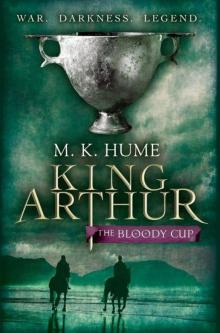 King Arthur: The Bloody Cup: Book Three
King Arthur: The Bloody Cup: Book Three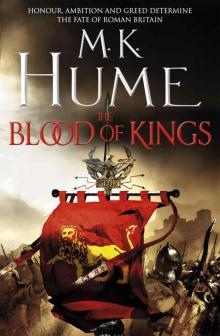 The Blood of Kings: Tintagel Book I
The Blood of Kings: Tintagel Book I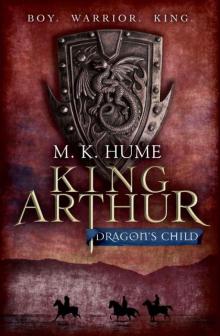 King Arthur: Dragon's Child: Book One (King Arthur Trilogy 1)
King Arthur: Dragon's Child: Book One (King Arthur Trilogy 1) King Arthur: Warrior of the West: Book Two
King Arthur: Warrior of the West: Book Two The Storm Lord
The Storm Lord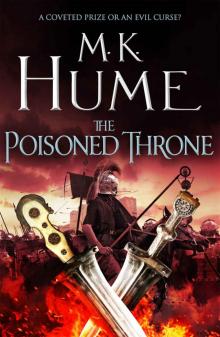 The Poisoned Throne: Tintagel Book II
The Poisoned Throne: Tintagel Book II![M. K. Hume [King Arthur Trilogy 04] The Last Dragon Read online](http://i1.bookreadfree.com/i2/04/07/m_k_hume_king_arthur_trilogy_04_the_last_dragon_preview.jpg) M. K. Hume [King Arthur Trilogy 04] The Last Dragon
M. K. Hume [King Arthur Trilogy 04] The Last Dragon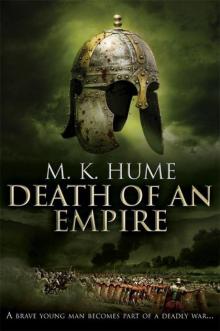 Prophecy: Death of an Empire: Book Two (Prophecy Trilogy)
Prophecy: Death of an Empire: Book Two (Prophecy Trilogy) Prophecy: Web of Deceit (Prophecy 3)
Prophecy: Web of Deceit (Prophecy 3)